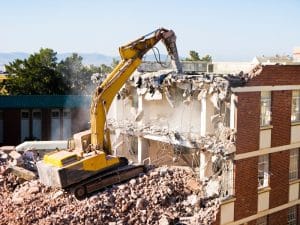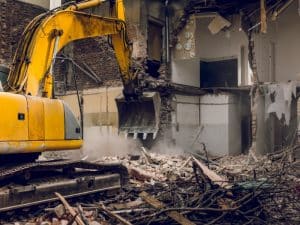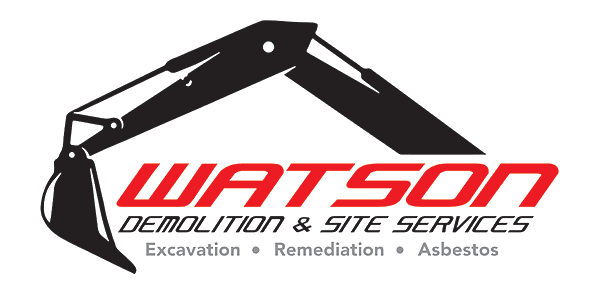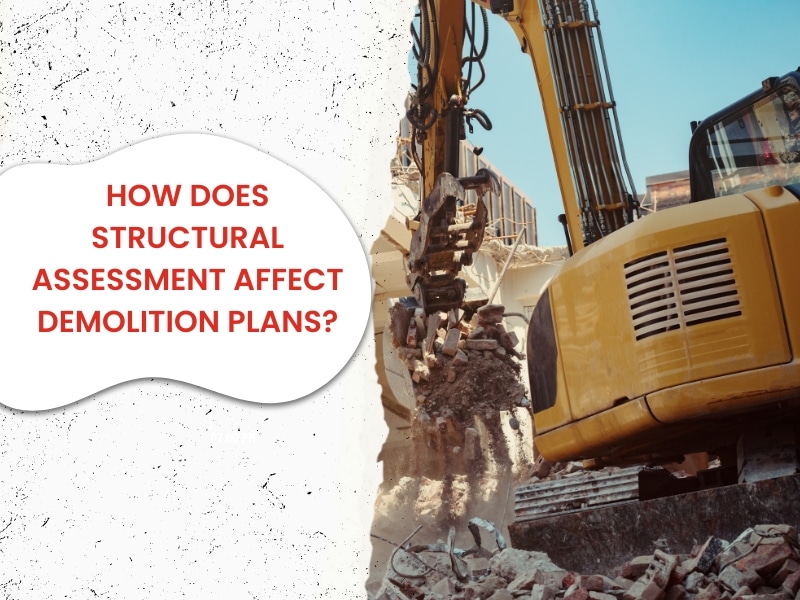Thorough planning is crucial for safe and effective demolition, with structural assessment at its core. This essential step ensures the safety, cost-efficiency, and smooth execution of demolition projects, whether residential, commercial, or industrial. Structural assessment shapes each phase of work, from site preparation to method selection and safety protocols, underscoring the importance of careful planning and experience. This article will explore how structural assessment influences demolition plans and its role in creating efficient, secure, and well-prepared projects.
What is structural assessment in demolition?
A structural assessment in demolition evaluates a building’s materials, layout, load-bearing elements, and potential risks. This process identifies challenges that could impact demolition, allowing teams to create tailored, safe, and efficient plans. Conducted by experienced professionals using manual and technological tools, these assessments are especially critical in densely populated areas like Newcastle and Sydney, where precise planning is essential.
Why is structural assessment crucial for safe demolition?
Ensuring safety is crucial in demolition projects, and structural assessments are critical. They are essential for:
- Identifying load-bearing structures: Pinpointing walls or beams that require special handling.
- Detecting hazardous materials: Recognising asbestos and other harmful substances for safe removal.
- Reducing accidental collapses: Preventing unforeseen structural failures that may cause accidents.
- Guiding safe machinery use: Ensuring heavy machinery is used without compromising stability.
- Assessing environmental impacts: Minimising dust, noise, and other hazards during demolition.
How does structural assessment guide the demolition process?
Structural assessment provides a detailed roadmap that shapes each stage of the demolition process. With these insights, demolition professionals can:
- Plan efficient demolition sequences: Identify the safest order to dismantle building sections.
- Select appropriate tools and machinery: Choosing a suitable demolition machine involves selecting equipment suited to the structure’s layout and materials.
- Develop waste management plans: Plan efficient recycling and disposal based on material types.
- Implement precise techniques: Use specialised methods for fragile or sensitive structures.
- Coordinate timing and workforce: Align resources, schedules, and personnel needs based on assessment findings.
Which aspects are evaluated in a structural assessment?
The comprehensive nature of structural assessments covers various critical components. Demolition teams typically assess:
- Material types: Identify whether the building is made of concrete, steel, wood, or other materials that influence demolition techniques.
- Foundation integrity: Assess the foundation for challenges in demolition or excavation.
- Structural stability: Check load-bearing walls, beams, and columns for controlled dismantling.
- Hazardous materials: Identify substances like asbestos that require special handling.
- Surrounding environment: Consider nearby buildings and utilities to avoid unintended impacts.
- Access points: Identify entry and exit points for equipment and personnel to ensure safety.
How do structural assessments affect cost and time planning?
Structural assessments play a significant role in managing costs and timelines, ensuring efficient resource use. They impact planning by:
- Estimating material removal needs: Inform us of the labour and equipment required.
- Reducing unexpected delays: Help avoid costly and time-consuming surprises.
- Optimising workforce allocation: Provide insights for scheduling the correct number of workers at each stage.
- Managing waste efficiently: Forecast disposal needs for sustainable waste management, which affects budget and logistical planning.
- Improving overall project scheduling: Enable realistic, accurate timelines for project completion.
How does safety factor into structural assessments for demolition?
Safety is essential in demolition, and structural assessments are crucial for enforcing it. They help teams to:
- Identify high-risk areas: Pinpoint sections needing specialised dismantling.
- Prevent hazardous material exposure: Detect asbestos and other harmful substances.
- Reduce worker injuries: Establish protocols to minimise accidents.
- Protect surrounding structures: Ensure nearby buildings and utilities are safe.
- Promote safe debris management: Plan for the safe handling and removal of materials.

How do structural assessments help with site preparation needs?
Structural assessments are vital for site preparation before demolition. They assist by:
- Directing excavation efforts: Inform the public about necessary earthmoving for safe access.
- Identifying utility needs: Guide the disconnection or relocation of essential services like water and gas.
- Defining access pathways: Set efficient routes for equipment movement.
- Planning safety barriers: Determine locations for protective barriers and fencing.
- Evaluating environmental factors: Prepare for landscaping to protect natural surroundings.
How does structural assessment impact commercial demolition?
Demolition of commercial buildings often requires additional considerations due to larger structures and high-traffic locations. Structural assessments for commercial projects:
- Address larger building components: Examine extensive structural elements like elevators, staircases, and multi-floor supports.
- Account for public safety needs: Emphasise safety measures in busy or populated commercial areas.
- Guide specialised equipment use: Inform the choice of machinery based on commercial structure sizes.
- Ensure regulatory compliance: Align demolition plans with local council and legal regulations.
- Plan for greater waste management: Manage and recycle Waste efficiently due to higher material volumes.
Why are experienced professionals vital for accurate assessments?
Experience is essential for a structural assessment, as trained professionals bring industry knowledge that ensures accuracy. Skilled assessors:
- Recognise unique structural features: Identify unusual building elements that need special handling.
- Understand local codes: Ensure compliance with Newcastle, Sydney, and Hunter Valley regulations.
- Detect hidden dangers: Identify potential hazards that are not visible at first glance.
- Apply proven methods: Use tested techniques to assess and dismantle buildings safely.
- Respond to client needs Tailor assessments to meet residential, commercial, or industrial project requirements.
How does structural assessment influence additional services?
Structural assessments often uncover the need for additional services, such as excavation or asbestos removal. These assessments can:
- Reveal hidden asbestos: Identify asbestos in old buildings, ensuring safe removal.
- Determine excavation needs: Inform any necessary earthmoving for safe site access.
- Highlight landscaping requirements: Pinpoint the need for tree and stump removal to clear space.
- Guide site restoration: Provide insights into post-demolition site clean-up needs.
- Plan for occupational hygiene: Ensure occupational health measures are in place for safe working conditions.

The foundation of effective demolition
Structural assessment is the cornerstone of any safe, efficient, cost-effective demolition project. By understanding the unique aspects of each structure, professionals can tailor their approach, ensuring that all steps—from safety protocols to waste management and site preparation—are aligned for success, especially when it comes to professional commercial building demolition.
Watson Site Services is a leading demolition and civil contractor in Newcastle, known for quality work and competitive pricing. Our team sets the standard with advanced techniques and dedicated service, from earthworks to asbestos removal, occupational hygiene, and demolition. At Watson Site Services, we are driven by a passion for exceeding expectations and leaving a lasting impact. Contact Watson Site Services today for a free consultation or quote and experience outstanding demolition expertise and customer care.

